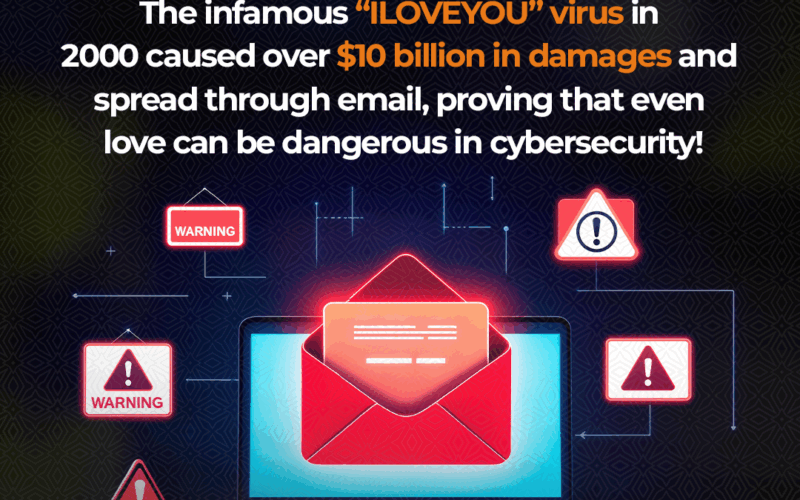The ILOVEYOU virus cyberattack remains one of the most devastating and unforgettable cyber incidents in history. In May 2000, a seemingly innocent email with the subject line “ILOVEYOU” landed in inboxes around the world. It looked like a love letter, tempting and harmless.
But one click on the attachment was all it took.
That email unleashed a powerful worm that infected millions of systems in just days, causing over $10 billion in damages and exposing how unprepared the world was for email-borne threats.
The ILOVEYOU virus is a chilling reminder that in cybersecurity, even affection can be weaponized.
What Was the “ILOVEYOU” Virus?
The ILOVEYOU virus was a self-replicating worm written in Visual Basic Script (VBS). It arrived as an email with the subject “ILOVEYOU” and an attachment named LOVE-LETTER-FOR-YOU.txt.vbs.
When opened, the worm:
-
Overwrote files on the infected system.
-
Stole passwords.
-
Sent itself to all contacts in the victim’s Microsoft Outlook address book.
This allowed the virus to spread globally in hours.
How It Spread So Quickly
-
Human Curiosity
The subject line and file name triggered emotional curiosity—people wanted to know who “loved” them. -
Trust Through Familiarity
Since the worm forwarded itself via Outlook, it appeared to come from someone the recipient already knew. -
Lack of Cyber Awareness
In 2000, users were not trained to question unusual file extensions or suspicious emails. Security tools were limited or nonexistent.
The Fallout
-
Over 50 million infections in the first 10 days.
-
More than $10 billion in damages globally.
-
Major government and corporate systems, including the CIA and Pentagon, shut down email services to stop the spread.
The economic and reputational damage was immense, pushing companies and governments to rethink cybersecurity policies.
Lessons for Businesses Today
Even though tech has advanced, human error remains the weakest link in cybersecurity. Attacks like ILOVEYOU prove how effective social engineering still is today.
Key Takeaways for Today’s Businesses:
-
Email Security is Crucial
Use advanced email filtering, anti-malware protection, and sandboxing. -
Ongoing Staff Training is essential.
Regularly update your employees on phishing trends, social engineering tactics, and how to verify suspicious messages. -
Never Trust Attachments by Default
Especially those from unknown sources or with unusual extensions like.vbs .or..exe.zip -
Have a Response Plan in Place
Quick detection and action can limit damage in a real-time attack scenario.
Cybercrime Today is Smarter
Modern threats don’t arrive as love letters; they come as fake invoices, contract documents, or internal memos. Phishing emails now use branding and language that mimic legitimate communication perfectly.
Your business can’t rely on luck. It must rely on preparation.
Conclusion
The ILOVEYOU virus cyberattack wasn’t just a tech incident—it was a turning point. It taught the world a harsh lesson: cyber threats can be wrapped in anything, even a message of love.
Cybercriminals are more cunning than ever.
Is your business ready for what’s next?
Don’t wait until it’s too late.
👉 Book a free consultation today and secure your systems before the next ILOVEYOU lands in your inbox.


